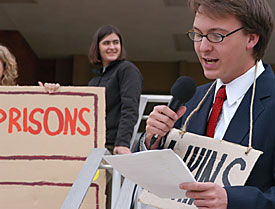 |
|
WILL SEBERGER/Arizona Daily Wildcat
|
Arthur Richards, undeclared freshman, satirizes UA President Pete Likins in a Students Against Sweatshops protest.
|
|
By Devin Simmons
Arizona Daily Wildcat
Friday February 21, 2003
Through the use of funding allocated for students, UA is perpetuating the incarceration of people nationwide while reaping befits of its own, according to protesters from the Students Against Sweatshops.
Members of SAS assembled in front of the Administration building at 12:30 yesterday afternoon to demand that the university stop doing business with those who do business with private prisons.
"We will not tolerate our money being pushed into companies that condone and capitalize on unnecessary imprisonment and inhumane conditions," said Erica Watson, a journalism and creative writing freshman and an SAS member.
In a letter from SAS to President Pete Likins on Jan. 30, SAS opened the debate by outlining the university's relationship with Lehman Brothers, an international bond-underwriting firm.
 |
|
Likins' response is typically irresponsible and frighteningly ignorant.
- Mark A. Rivera
classics graduate student
|
 |
Lehman Bros. has underwritten bonds for the university in the past, according to SAS, including an $18.6 million contract in 1999 for parking and student housing facilities, and a $93.1 million contract in 2002 for system revenue refund bonds.
Lehman Bros. is also one of the leading bond-underwriters for the private prison industry. According to the letter, Lehman Bros. single-handedly bailed out the Corrections Corporation of America in 1999, giving it a waiver on a credit agreement to keep it out of bankruptcy.
The Corrections Corporation of America is the leading private prison industry in the country and the sixth-largest corrections system overall, with 60 facilities in 21 different states, according to the company's Web site.
The Corrections Corporation of America has three facilities in Arizona housing up to 5,405 inmates, including criminals from Alaska and Hawaii. Two of the facilities are in Florence and with another in Eloy, according to an overview of private prisons in Arizona released by the American Friends Service Committee.
SAS contends that some of the money from tuition increases is being used to pay for new construction bonds. When the bonds are paid back, the money then finds its way into private prisons, protesters said.
Julian Kunnie, an activist on campus who spoke at the protest, called the growing prison industry a slave system. Kunnie also said that companies such as Victoria's Secret, Boeing, and Westinghouse exploit the prisoners for cheap labor.
"This whole system is destructive," Kunnie said. "We can not allow ourselves to be unconsciously dragged into supporting an unethical position."
Other SAS members claimed that private prisons are the scenes of sexual harassment, rape, and other forms of violence.
"I don't know for sure that private prisons are any worse then public ones," said President Pete Likins. "In general prisons are not pleasant places to be."
One prison in particular, the Florence Correctional Facility, has a record of violence including the deaths of two inmates, assaults of six others, and a riot that left one officer with six stitches. All of these events happened in April 2001, according to an August 2001 article in the Arizona Daily Star.
According to the article, after completing a three-day tour of the prison, officials from Hawaii determined that the facility was e being run by a gang of 100 Samoans. They claimed that there was widespread drug use and that some of the gang members were having sex with female inmates from the Immigration and Naturalization Service, the article stated.
SAS wants President Likins to divest interest in Lehman Bros. and to instruct the Task Force on Labor and Human Rights to draft a Code of Conduct for companies that underwrite bonds for the university.
On Feb. 6, in a response to the SAS, Likins declined both requests, calling their approach "indirect and ineffectual."
Likins stated that anyone might request, with equal justification, that the university decline to do business with companies that have a relationship with tobacco, alcohol, arms, agricultural or textile industries or any of a long list of countries engaged in violations of human rights.
"The university, and universities all over the country, have been dealing with these types of questions for decades," Likins said. "We cannot get caught up in this deep cycle of litigation. It's a Pandora's box."
Despite the response, SAS will continue to press forward with its agenda, hoping to get a meeting with Likins.
"Likins' response is typically irresponsible and frighteningly ignorant," said Mark A. Rivera, a classics graduate student.
He regarded Likins' response as a cop-out. Rivera recognizes the university has vital connections to numerous businesses directly and indirectly, and he sees this as a position of power rather than weakness.
"The difference between our perspectives is that he thinks that because of these connections his hands are tied," Rivera said. "But I see his position as one of power. He is one of the most powerful people in the state."
Students watching the protest had mixed reactions.
"I don't support capital punishment, but we can't just let criminals go free," said David Hopkins, a pre-business freshman. "I give them respect, but where else are we supposed to put these people?"
Other students were interested but wanted more information.
"I think this is definitely an issue," said Kate Walker, a media arts junior. "I am not sure that what they are saying is true. It was a good protest, but I would like to see where they got their information."

